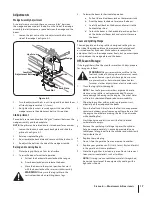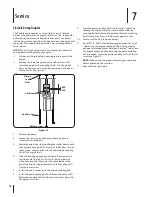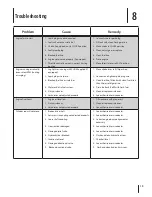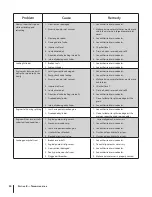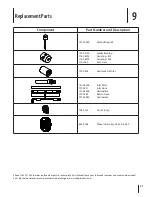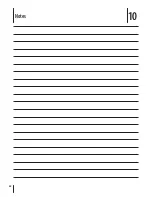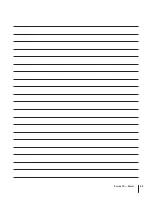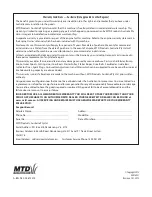
11
S
ection
3 — A
SSembly
& S
et
-U
p
Set-Up
Preparing the Log Splitter
1.
Lubricate the beam area (where the splitting wedge will
slide) with engine oil. Do not use grease.
2.
Remove the vented reservoir dipstick, which is located
next to the hydraulic filter on top of the reservoir tank. See
Figure 3-11.
Vented Dipstick
Figure 3-11
3.
Fill the reservoir tank with approved hydraulic fluid which
includes Shell Tellus® S2 M 32 Hydraulic Fluid, Dexron® III/
Mercon® automatic transmission fluid, Pro-Select™ AW-32
Hydraulic Oil or 10WAW-ISO viscosity grade 32 hydraulic oil.
It is not recommended that fluids be mixed.
NOTE:
The reservoir tank has a capacity of approximately
5.8 gallons (21.95 liters) and the entire hydraulic system has
a capacity of 7.8 gallons (29.52 liters).
4.
Check the fluid level using the dipstick. Do not overfill.
5.
Replace the vented dipstick securely, tightening it until the
top of the threads are flush with top of the pipe.
6.
Disconnect the spark plug and prime the pump by pulling
the recoil starter as far as it will go. Repeat approximately
10 times.
7.
Reconnect the spark plug wire and start the engine
following the instructions in the Operation Section.
8.
Use the control handle to engage the wedge to the farthest
extended position. Then retract the wedge.
9.
Refill the reservoir within range marked on the dipstick.
See Figure 3-12.
Dipstick
MAX
MIN
Hydraulic Fluid
Only
Figure 3-12
10. Extend and retract the wedge 12 complete cycles to
remove trapped air in the system (the system is “self-
bleeding”).
WARNING!
Much of the original fluid has been
drawn into the cylinder and hoses. Make certain to
refill the reservoir to prevent damage to the
hydraulic pump. Failure to refill the tank will void the
log splitter’s warranty.
NOTE:
Some fluid may overflow from the vent plug as
the system builds heat and the fluid expands and seeks a
balanced level. Do not operate the log splitter without the
proper amount of hydraulic fluid in the reservoir tank.
Tires
The max operating pressure is 30 psi. Under any circumstances
do not exceed the manufacturer’s recommended psi. Maintain
equal pressure on all tires.
WARNING!
Excessive pressure when seating beads
may cause the tire/rim assembly to burst with force
sufficient to cause serious injury.
Gas and Oil Fill-Up
Service the engine with gasoline and oil as instructed in
the engine manual packed with your log splitter. Read the
instructions carefully.
WARNING!
Use extreme care when handling
gasoline. Gasoline is extremely flammable and the
vapors are explosive. Never fuel the machine
indoors or while the engine is hot or running.
NOTE:
Your log splitter is shipped with motor oil in the
engine. However, you MUST check the oil level before
operating. Be careful not to overfill. Gasoline can be
added to the engine when the log splitter is in either the
horizontal or vertical position. However, there are less
obstructions when the machine is in the vertical position.
Summary of Contents for RM 33 LS
Page 22: ...Notes 10 22...
Page 23: ...23 Section 10 Notes...

















